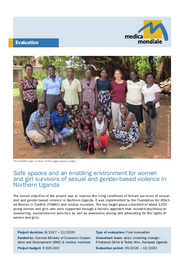Evaluation Northern Uganda: Hope for a self-determined life without violence

In northern Uganda, a fierce conflict between the Lord's Resistance Army rebel group and the Ugandan army came to an end some 20 years ago. Today, the brutality of this war still impacts on the sub-region known as Acholiland. The Lord's Resistance Army built up its forces from abducted children: boys were turned into child soldiers, while girls were systematically raped and sexually enslaved. An enormous effort was put into reconstruction but are still many shortcomings in the areas of health care, education and infrastructure. In the districts of Lamwo and Omiya Anyima, where the project supported by FOWAC and medica mondiale took place, many people still suffer from acute malnutrition. Also, an alarmingly high number of cases of violence against women and girls are still being recorded.
Holistic support for survivors of sexualised violence
With the support of medica mondiale, FOWAC worked to support women and girls who have survived sexualised and gender-based violence to find new hope and build a future for themselves. By establishing joint savings groups, they were strengthened economically and were able to build up their own livelihoods. Psychosocial counselling enabled them to find ways to deal with their experiences of violence. And in self-help groups they found a place where they could share their feelings and concerns with others. The project also provided funds for health care services for girls and women. All this took place in close consultation with relatives and important representatives of the communities.



